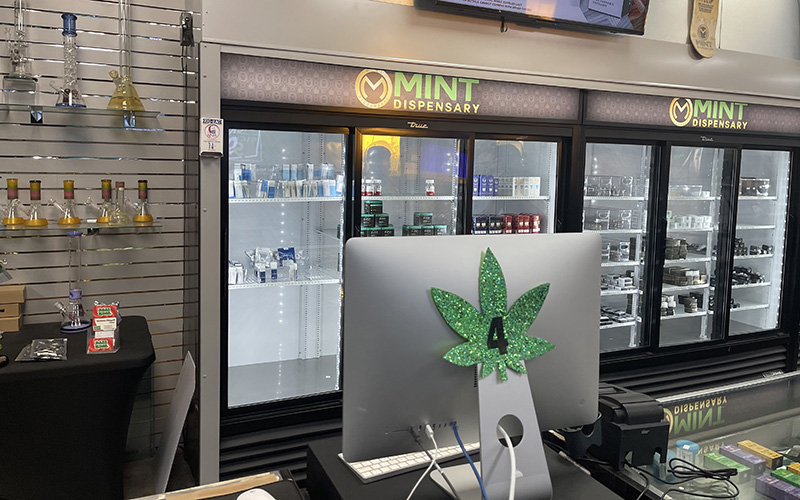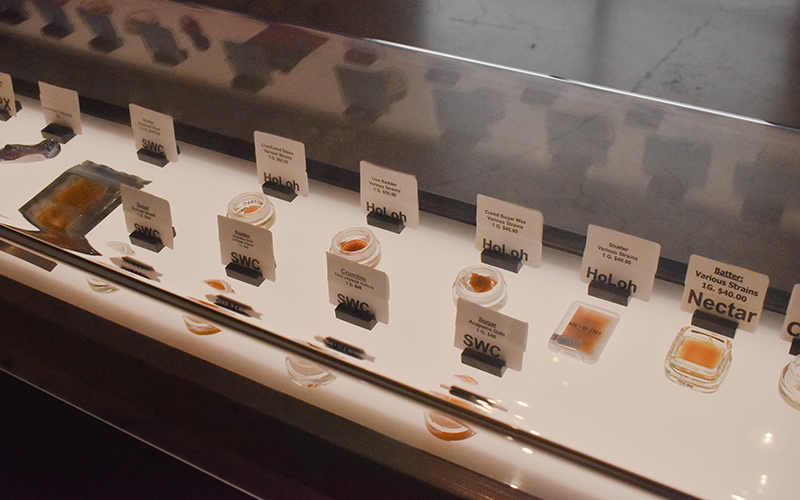PHOENIX – Raul Molina lived a simple life growing up in Ciudad Juárez, Mexico; he remembers catching tadpoles, playing in the mud and placing pennies on railroad tracks to be flattened.
Instead of counting pennies these days, he’s counting the millions his cannabis company, Mint Dispensary, brings in.
“I’m an anomaly, you know, what I did. Mine was all hustle,” Molina said. “I got a lot of lucky breaks from a lot of people who believed in me and helped me get to where I was.”
Now, a few more Arizonans may catch a similar break, thanks to the state’s new marijuana social equity program. It will allow minorities, low-level marijuana offenders and others affected by the lengthy war on drugs to purchase one of 26 licenses available to qualified candidates. The 26 are among the 169 retail licenses that have been issued across Arizona.
With the legalization of recreational marijuana in Arizona and 17 other states, the U.S. cannabis market is growing rapidly. By 2024, the National Hispanic Cannabis Council projects the industry will be worth at least $30 billion.
Molina pioneered the nation’s first cannabis kitchen with his partner, Eivan Shahara, in 2018. Customers can order such American favorites as macaroni and cheese, hamburgers and chocolate cake – all infused with cannabis.

Mint Dispensary has three locations in the Phoenix area. (Photo by Kylie Cochrane/Cronkite News)
Although Molina isn’t applying for a social equity license, he hopes to work with some social equity partners in the state.
“I tell people all the time, if you’re wanting to get into the industry, it’s too late to get in,” Molina said. “But tomorrow’s even worse, so you might as well jump in.”
Along with legalizing recreational marijuana, last year’s voter-approved Proposition 207 requires the Arizona Department of Health to award 26 retail licenses to people impacted by the nation’s war on drugs. To be eligible, applicants or a family member must have a previous low-level marijuana conviction, live in one of 87 ZIP codes identified as “disproportionately impacted by the enforcement of previous Arizona marijuana laws,” and have a household income less than 400% above the poverty line.
Since September, more than 800 potential applicants have attended the training required by ADHS.
“We are laying the groundwork so that people from roots who have been disproportionately impacted by marijuana enforcement can apply, and open and operate marijuana businesses,” said Steve Elliot, the communications director for the state health department.
But being able to apply, then open and operate a marijuana business, is no easy or inexpensive feat. Applicants must pay a nonrefundable application fee of $4,000, assemble a board of directors and prepare to operate in a tightly regulated industry.
In theory, the program should help minority groups. Right now, only about 5.7% of cannabis businesses are owned by Hispanics.
“Hispanics really faced a terrible burden in the war on drugs,” said Brian Vicente, cannabis lawyer and the president of the National Hispanic Cannabis Council. “The reason marijuana is prohibited dates to the early 1900s, and it was these laws that were put in place really to criminalize Mexicans. Since that time, we’ve seen a disproportionate number of Hispanics arrested, prosecuted and jailed for cannabis for decades.”
The cannabis council has been tracking social equity programs around the country, including Arizona’s.
“It’s worth noting that there’s a broad national discussion about what are the best ways to try to address the harms the war on drugs caused,” Vicente said. “Whether you’re in New York, California or Arizona, everyone’s trying to figure this out, so I applaud Arizona for giving this a shot.”
Danielle Hernández, a cannabis insurance agent in Gilbert, said she grew up in a border city “where we had (drug) mules coming over, where we saw things like that happen, where I had friends and family members that were affected by some of these draconian laws.”
“It’s great to be able to kind of turn the page,” she said.
“The idea behind all of this is to create generational wealth and change the conversation from it being primarily white and male.”
But Arizona’s social equity program may not be as equitable as it seems, Hernández said.
“We were seeing stuff posted on Craigslist, looking to basically adopt a felon,” she said.
In one job posting Hernández shared, the poster was looking for a dispensary owner to back – but only would pay the owner $60,000 a year.
“What we know from the valuation of licenses in the state of Arizona being 10 million (dollars) before they are even up and operational is that disparity of income is very concerning and the lending practices that are already being put in place,” Hernández said.
And that’s just the start of the problem, she said. In the final rules drafted by ADHS, applicants can’t enter prior agreements to sell their licenses. But once the license is issued, there is nothing that says the owner must keep it. This vague language means winners can later sell to those who don’t qualify under social equity, Hernández said.
Molina saw this happen in Illinois after he opened dispensaries there with a social equity partner.
“What’s social equity about that?” Molina asked.
Proposition 207 wasn’t structured well, Vicente said, “and how these licenses will be handed out, I don’t think it’s perfect.”
But he thinks it was well-intentioned.
“I think that the health department and voters really want to do the right thing. They recognize that Hispanics, other people of color and disenfranchised groups really deserve an opportunity to benefit in this new economy.”
Molina said he would “love to see a lot more Hispanics, and to be honest with you, any, any type of immigrant. It adds a certain drive to the industry.”
With only 169 licenses available in the state, ADHS expects thousands of applications for these coveted 26 licenses. Applications open Dec. 1.

